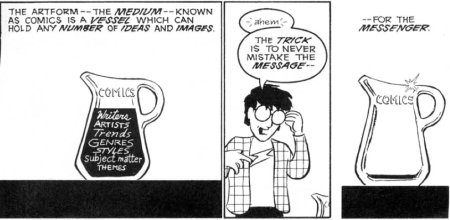
Over the holidays, I picked up a copy of Scott McCloud’s Understanding Comics: The Invisible Art. It’s a comic about comics as a medium, and the concepts and vocabulary (abstraction, closure, transitions, etc.) that define it. McCloud avoids using specific artists, styles, genres or themes as a template, focusing instead on a critical universal examination of the artform. As someone who recently rediscovered comics, it’s been a truly fascinating read. The book also interests me because I can relate many of his ideas to another nascent medium that is of particular interest to me: video games.
In the first chapter of Understanding Comics, McCloud asks “what is comics1?” He begins with Will Eisner’s definition “sequential art”, which he considers too broad (for instance, animations are sequential art) and gradually refines to: “juxtaposed pictorial and other images in deliberate sequence, intended to convey information and/or produce an aesthetic response in the viewer.”

This, of course, made me wonder: “what are video games?” What qualities define video games as a medium, and could be used to distinguish non-video games. We could begin by examining video games as a compound word, where a game is generally defined as:
Activity engaged in for diversion or amusement
– Merriam Webster Dictionary
Note that this definition already implies a purpose, entertainment. This quality is true of the large majority of games, but does it truly define the medium? We’ve seem games such as The Passage and Execution whose function is less amusement and closer to the purpose defined by McCloud for comics: “intended to convey information and/or produce an aesthetic response in the viewer.” “Video game” therefore works poorly as a compound word.
This raises many questions: is “game” then a legacy term? Have video games outgrown “games” in the same way comics have outgrown “comedy” (via Latin, from the Greek komikos)? Would the term “interactive art” be more appropriate? Note that “art”, however, implies a value judgement and therefore cannot define the medium. While these are interesting considerations, they don’t answer the question of “what are video games?”
Next, we can examine what definitions already exist for video games. Merriam Webster defines a “video game” as:
An electronic game played by means of images on a video screen and often emphasizing fast action.
I’m sure I’m not the only one who let out a frustrated groan at the “emphasizing fast action” bit. However, there is some value that can be gleaned from this definition. I think defining video games as being “played by means of images on a video screen” is valid, and helps to distinguish video games from card games, board games and sports.
The Cambridge Dictionary of American English defines them as:
A game in which the player controls moving pictures on a television screen by pressing buttons or moving a short handle.
While pragmatic and largely accurate, this strikes me as a particularly narrow definition. For instance, specifying a “television screen” excludes both PC and handheld games. Must the player input controls by a button or “short handle”2? What about Wii Fit, which is played entirely with the balance board?
Finally, the Random House Unabridged Dictionary includes the following definition:
Any of various games played using a microcomputer with a keyboard and often joysticks to manipulate changes or respond to the action or questions on the screen.
Ignoring the bit about keyboards and joysticks, this definition introduces an intriguing point about microcomputers. Video games are software, but do they have to be? It’s certainly possible to display images on a video screen without a processor.
However, what distinguishes video games from film is not a “short handle” or “fast action” but interactivity. The player “responds to the action” and the game changes what is displayed on screen accordingly. The quality of interactivity necessitates a computer processor, therefore video games must be software3.
While it lacks the succinctness of McCloud’s comics definition, I would propose the following definition for “video games”:
Software which displays images on a video screen, interacts with a player or players and is intended to provide challenge and/or produce an aesthetic response in the viewer.
Note what this definition excludes: a board game isn’t played on a video screen, a screen saver isn’t interactive and an Excel spreadsheet isn’t intended to produce an aesthetic response. Wii Fit, The Passage and Final Fantasy meet the criteria, and it’s likely that future games will as well4.
However, you don’t have to take my word for it! I invite you to please challenge my definition and come up with your own. How would you define video games?

1 This isn’t a typo, McCloud defines the entire medium as “comics” singular.
2 …or a long handle for that matter!
3 Occasionally only hardware, I suppose.
4 Until video screens become obsolete?







January 3rd, 2009 at 1:27 am
Interesting post. I’ll have to mull on your definition for a while. At first glance, it seems fairly reasonable.
I usually refuse to separate the words ‘video’ and ‘game’ because I think that ‘videogame’ as one word inherently implies a break with the historical carry-overs you talk about. It isn’t necessarily ‘video’, because really, most games aren’t played on raster-based displays these days, and it isn’t necessarily a ‘game’ either. It’s a ‘videogame’, something totally new that has been formed through these ideas.
I’ll also have to pick up McCloud’s book one day. I’ve been told by many that it’s one of the best books indirectly about videogames.
January 3rd, 2009 at 2:23 am
I agree with Daniel, it’s a very interesting definition and (at least after a few minutes of thinking) quite a robust one.
I think it’s a little bit of a case of “you know it when you see it”, as has been said of pornography numerous times. While that may not be satisfactory for some, it’s usually quite obvious to (most?) people when something is a videogame and when it’s… well… something else non-interactive.
Personally it’s the interactivity that seems to be the really integral part for me – like you say, the screen is just the dominant current method of representation. I can easily imagine an audio only game with voice interaction somewhat like the ships’ computer in Star Trek. Perhap’s the part about a screen could be refined to just some form of quickly and easily graspable feedback…
Also the fact you define it as being “intended” is potentially problematic, particularly when it comes to emergence and unintended consequences or results… although that could be easily included within the definition by saying that “the unpredictable emergence” was itself intended…
Wow, this gets awfully complicated very quickly. Great post!
January 3rd, 2009 at 7:24 am
I think the “and/or” is potentially the most important part of that definition.
January 3rd, 2009 at 10:40 am
Excellent post.
I think dropping “provide challenge” would only serve to strengthen your definition. It strikes me as redundant, as challenge is really an attempt to produce a narrow-band aesthetic response.
I also think limiting it to visuals is problematic, as the IndieCade winner, Dark Room Sex Game demonstrates.
The inclusion of both visuals and challenge in the definition is pejorative towards a particular type of game and ultimately weaken the broad appeal of your definition.
Also, to nitpick a grammar point that my wife has had to beat into my thick skull, use “which” after a comma, otherwise use “that.” So how does it scan without those bits?
I like that more clearly communicates your intent. What do you think?
January 3rd, 2009 at 10:41 am
…and I meant prejudicial, not pejorative.
January 3rd, 2009 at 1:43 pm
“… is “game” then a legacy term?”
Depends on how you look at it. If from “game,” we’re inheriting the importance of a ruleset, then “game” is an important part of the concept of “video games.” Hockey is distinct from skating and hitting a piece of plastic with wooden sticks because of its rules. But the amusement/diversion bit of “game” is definitely legacy.
I’m in the camp with folks that think the heart of games is a ruleset and some “games” veer dangerously close to losing the game part. Those things I’d call “interactive art,” but they’re distinct from “video games” in their lack of a meaningful ruleset. There are plenty of interactive pieces of art that are run by software, but I can’t imagine any of us calling them video games.
And I’m a little concerned about the “aesthetic” part too. It’s kind of a loaded term, since it’s so bound to notions of beauty and possibly taste. Would “emotional response” be more appropriate? I’m not sure if playing Tetris produces an aesthetic response in me, but it certainly produces emotional ones (feeling challenged, frustrated, successful, etc.).
I’d probably end up with this definition, but it could be hugely biased to my way of thinking:
“Software intended to produce an emotional response in a player or players though interaction with a set of rules.”
That’s just off the cuff though, I’d need to think about this a bit more.
January 4th, 2009 at 10:47 pm
Nice, I actually used the Webster’s definition for my first GaA post last year.
I’m more comfortable with what Corvus proposed though. That simple “provide challenge” really works against the broad efficiency of your definition.
~sLs~
January 5th, 2009 at 2:13 pm
Relating to what Corvus said, another example of a game that doesn’t have visuals is “In the Pit,” an Xbox Live Community game.
January 5th, 2009 at 2:16 pm
What about “Interactive software that produces an aesthetic response in players.” Is anything really lost by cutting it this way?
January 5th, 2009 at 2:16 pm
Sorry…or instead of “players,” “users”.
January 5th, 2009 at 8:22 pm
Thanks for the feedback everyone!
@Daniel: I like that distinction! I still think it’s odd that we talk about “non-game videogames” such as Electroplankton though.
@Ben: Truthfully, I’m not entirely certain why McCloud felt the “intention” part was necessary in his comics definition. It adds pragmatic value but, I agree, is a bit ambiguous and needlessly restrictive.
@Corvus: I opted to include “provide challenge” largely because, as you wrote, it’s one of the aesthetic responses that is unique to the medium. I agree that dropping it would likely strengthen the definition. I’m also uncertain as to the breadth of the term “aesthetic response”; could “convey information” fall under that heading as well, making McCloud’s definition redundant? As I mentioned to Ben, the whole “intention” part is a bit cloudy to me.
I see your point about limiting to visuals. My problem with dropping the “video screen” part is that it opens up the definition to dubious inclusions. For instance, is the robot dinosaur toy “Pleo” a video game? Without the “video screen” part, it would be.
@Nels: I don’t think the quality of being a “game” is a necessary quality of the video game medium, it just happens to be one particular type of interactive software. I’d perhaps be more comfortable with having “interactive art” as the medium name with “games” being a subset.
That seems like a very loose definition of “emotion”, I’m not sure what is gained from specifying it that way. Wouldn’t aesthetic responses include emotional ones?
@Travis: I’m nitpicking, but I think it’s important to specify that the software must interact with human players to be a video game (as opposed to interfacing solely with other machines.) I also don’t think it’s safe to assume that the viewer will necessarily have a response, just that the creator intends it.
January 5th, 2009 at 8:43 pm
It’s true that I say challenge is a unique narrative device to video games. What I don’t say is that it needs to be there to qualify a narrative as a video game (I’m tired, so I’m not sure that sentence makes as much sense as I’d like it to).
And now that you mention it, why shouldn’t a Pleo be considered in the same grouping as video games? Perhaps the definition we ought to be seeking out out to be the collection of interactive software-driven toys of which video games are merely an extension.
January 6th, 2009 at 2:51 am
@Corvus: I’m not opposed to defining video games as a subset of “interactive software/hardware toys”, but I don’t think this changes the fact that video games should be defined to exclude things like Pleo. If our definition is too broad, then it would be difficult to go on to analyze the unique vocabulary of the medium.
To use another example, comics could be considered a subset of books or drawings, but to analyze what’s unique about the medium we need a narrower exclusive definition. McCloud’s definition, for instance, excludes single panel cartoons (Bizarro, Family Circus) as being fundamentally different from comics, which in turn allows him to discuss the important of closure and transition.
January 6th, 2009 at 8:38 am
@Corvus It made sense to me! Not all video games have to be designed to provide a challenge for the player. Or do they? If there’s no intended challenge, is it a game? Or just an interactive experience.
January 6th, 2009 at 11:47 am
@Travis: As I said in my post, I think “game” is a legacy term leftover from the arcade days. Modern video games are too diverse and interesting to necessarily require challenge (hence the “and/or” in my definition.)
January 6th, 2009 at 12:27 pm
I was trying to get at this on Twitter, but I think the “game” part of video games in important, in that it conveys a coherent ruleset that essential to the thing’s nature.
I definitely agree that a tight definition is essential for a meaningful discussion. Pinball games are distinct from video games as Pleo is, yes? Claw machines are too, right? As you suggest, the best thing to do may be consider video games to be an inherently visual subset of “interactive electronic games.” Wikipedia groups it this way (somewhat) and that might be sufficient.
January 7th, 2009 at 8:59 am
@Matthew That’s why commenting in the morning is a no-no for me. Also, commenting on a comment without re-reading the original post for context at any time is a problem!
January 7th, 2009 at 8:35 am
I guess I don’t disagree with the arguments excluding the Pleo. But the more I’ve thought about it, the more dissatisfied I’ve become with the term ‘video game’ anyway.
January 7th, 2009 at 8:45 am
Also, Claw Games and Pinball aren’t software driven. They use software, sure, but gameplay is driven by the pure mechanics of the user interacting with their hardware systems.
January 7th, 2009 at 8:08 pm
Since Corvus’ post didn’t leave a trackback, I suggest you all go check out his long-form thoughts on the matter.
I also have an edge case title that I have difficulty reconciling with the definition of video game: is Personal Trainer Cooking a video game? or is it simply educational software?
@Nels: I agree that video came could definitely be considered a subcategory of “interactive art”. I thought Wikipedia/Wikitionary’s distinction of electronic game as a hypernym of video game / computer game / mobile game was interesting, even if I see little support for it in other dictionaries and common vernacular.
January 7th, 2009 at 8:58 pm
[…] that’s up to you what is a game types. I only know this: by the end of the night, Zach was back in his studio, this […]
January 9th, 2009 at 7:40 pm
I really like this post, especially as it weaves comics in at the beginning. :) I’m wondering, though, with the definition you posit, would something like InfoCom Games qualify as a videogame? I would say yes, if the “images” part of the definition was expanded to include something like “text” as well. Maybe, “Software which displays images and/or text on a video screen, interacts with a player or players and is intended to provide challenge and/or produce an aesthetic response in the viewer.” Though, maybe the word text should be expanded to express that it’s story-driven text or explanatory text, not instructive or non-fictional?
January 9th, 2009 at 7:47 pm
@Rob: I was asked a similar question on Corvus’ blog, and gave the following answer: “In Understanding Comics, McCloud defines letters as static images, which can be arranged into words.” It’s a debatable definition, but by that logic the video game definition already includes text adventures.
However, now you have me wondering if including “and/or text” in the the definition would strengthen it. Thanks for the thought provoking comment :)
January 20th, 2009 at 11:30 pm
I think that Dan’s made a pretty good case for using the term ‘videogame’; I may have to alter my position on that debate at this point. I had previously inclined towards the term ‘video game’, though not really for any reason other than because I had thought that it was the most widely used term. I have attempted to argue that video games (is) a subcategory of games in the past, but I’m not willing to support this view any longer.
I like your definition. I like the idea that these video games aren’t just electronic ‘games’, but that they’re something wholly new and different–that some of them can be that, for sure, but that some of them are this other thing, too, and that we’re okay with that.
The problem with it is that it doesn’t really make video games an easily recognisable medium. Is a DVD menu of Proustian profundity a video game? By your definition, I’d argue that it is. The images on the screen might display Proust’s words or his face; the interaction would involve the player’s selection of answers to questions, or highlighting certain sections of texts for deeper analysis. The aesthetic response is self-explanatory: this is Proust.
So–great, right?
But does that mean that Wikipedia is a video game? Technically, it also contains all of these elements you mention. I feel that it passes under your definition. Hell, even http://gangles.ca/ is a video game. And why not, you might ask, since so many of our greatest video games in the past have been browser games? All the same, I don’t think that I’d be alone in speaking of my discomfort with this idea. I don’t want to think of Wikipedia as a video game. It simply isn’t one to me.
So it becomes obvious that I too feel that ‘games’ is a legacy term, even if it’s one I’m not willing to throw out just yet.
January 21st, 2009 at 2:36 am
@Spencer: I agree, the most difficult part of defining “video games” is separating them from software that is not video games. I don’t think any definition we could come up with could plausibly exclude your Proustian DVD without in turn excluding any number of non-game video games.
I’m not sure I understand your web site comparison though. Wikipedia isn’t designed to produce an aesthetic response, it’s designed to provide and accept information.
In a more general sense, the experience of a web site is produced by two software entities: servers and browsers. Both are software designed to transport and display information, not produce an aesthetic response. A person may, however, have a response to my writing, which is another thing altogether.